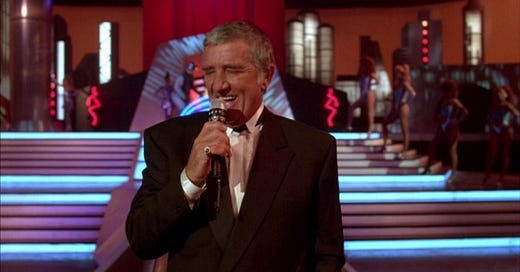Adaptation Examination: The Running Man (1987)
Looking at how well the Arnold action flick serves the original story.
It’s the 1980s. You and your family sit down to watch everyone’s favorite game show. Both you and the studio audience jump for joy when Richard Dawson, long-time beloved game show host and the host of this very program, bursts onto your television screen. There are no smooches here for America’s jovial Kissing Bandit, as tonight he means business. It’s time to play…
The Running Man.
You thought I was going to say Family Feud.
I guess I lied a bit. It’s not actually the 80s, it’s the year 2017, 30 years after the release of the 1987 sci-fi action film The Running Man.
We’ll come back to Dawson later.
The film is based on the 1982 novel of the same name by Richard Bachman, who passed away from cancer just a few years later when it was discovered that he was really just acclaimed author Stephen King writing under a pseudonym.
And although he likes to give Bachman all the credit, (just read King’s introduction to the Bachman Books, “The Importance of Being Bachman” — he truly speaks of Dick as another person), The Running Man is King through and through. No doubt written in a coke-fueled haze, King recalls that he wrote the entire novel in just a week and thanks to that insanity it is certainly filled with some signature King (and Bachman) turns. Fantastic world-building, evaluations of the human condition, and a disdain for people in power can’t be missed. Throw in the world and social perspectives of a 1982 Stephen King and you’ve got a dystopian world that could only exist in King’s mind.
It’s the not-so-distant future. The country is in shambles with record unemployment. Ben Richards watches his infant daughter get sicker and sicker every day. He quit his job in protest of the inhumane working conditions, so now his wife takes to the streets in an attempt to support their family. Ben can’t take it anymore. Desperate for cash, he signs up for The Running Man, a live game show with only one goal: stay alive. The grand prize of one billion dollars is at stake. To do that, he must avoid the Hunters (skilled assassins with only one goal of their own) and everyday people looking to cash in themselves by giving Ben up to the Hunters and their employer, the Games Network, the mega-corporation that controls the airwaves while also controlling peoples’ lives.
To tell you anymore would also meaning spoiling the best parts of the crescendo, but I can promise you this: You will never guess how each situation Ben finds himself in resolves…or doesn’t.
I love Arnold Schwarzenegger. He makes total crap worth watching. He’s the ultimate movie star.
And we wouldn’t have the Arnold we know and love today if it wasn’t for the monster year he had in 1987. Before then, he had standouts like The Terminator and Commando, but his career was mainly filled with glorified B-pictures like Hercules in New York, Red Sonja, and the Conan series.
1987 solidified his stardom. In the summer of that year, a little film called Predator came out and grossed nearly $100 million. November brought us The Running Man. That year was make or break for action hero Arnold and he delivered. The following years gave us Total Recall, T2, and Last Action Hero. We wouldn’t have those films if it wasn’t for ’87.
But, unfortunately, Arnold was the wrong choice for this part, as much as I love him and it pains me to say that. The problem is: Ben Richards is supposed to be an everyman and there is absolutely nothing everyman about Arnold Schwarzenegger. That’s why he worked so well as the T-1000 and Conan the Barbarian.
Even Stephen King himself is quoted as saying that his character was “as far away from the Arnold Schwarzenegger character in the movie as you can get.”
Well, I suppose that’s really the matter of contention here. The producers didn’t have much interest in taking the Stephen King story and putting it to film. They wanted to make an action film with the most up-and-coming of up-and-comers and they dug the elevator pitch that is The Running Man. Stephen King movies were hot, (The Shining, Children of the Corn, and Stand By Me all came out in the few years preceding) and that premise with that name attached could sell the movie that they wanted to make.
The book sees Ben on the run across the United States, hiding out in various safe houses and sanctuaries hosted by different allies who would prefer being an enemy of the state over an accomplice to the Games.
The film, on the other hand, places the game inside a gladiator-esque arena, which I’m sure looked cool in 1987 but now looks like a laser-tag course. Regardless, the comparisons to American Gladiators are real and abundant. That show, which premiered in 1989, was the cheesiest cheese you’ll ever cheese — a show which followed amateur athletes as they went toe-to-toe with muscular men and women, or modern-day gladiators. You’ll see that comparison everywhere online. However, it should be noted and often isn’t that American Gladiators came out two years after this film. No doubt they were inspired by The Running Man. It’s an intense game in a giant arena where everyday contestants face off in physical and athletic challenges against super-humans designed to stop them. Only in the case of The Running Man, losing means death.
Ben must battle The Stalkers (changed from the Hunters in the book — a big, necessary change) played by the likes of Jesse “The Body” Ventura and former NFL MVP Jim Brown with nicknames like Fireball and Buzzsaw, while American Gladiators saw superjocks with names like Turbo and Nitro.
The point is: If you are in the midst of reading The Running Man and someone were to stop you mid-chapter to warn you that the film adaptation is much more American Gladiators than something like The Fugitive or the Bourne series, you wouldn't believe them.
But the film really does relish the reality show aspect of its plot. Bringing in Richard Dawson, longtime lovable host of Family Feud, to basically parody himself in playing the magnetic emcee in this horrific competition was an excellent idea. Dawson loves the lampoon and in bringing his own charm, brings an authenticity to the game show within the film. Audiences in the 80s knew and loved Dawson and to flip that on its head and make him the film’s primary villain was a great idea. His fixation on bringing down Schwarzenegger deepens that intruding force that the book was lacking.
Ultimately, both the book and the movie are stories about survival — the metaphor is hard to miss. In the book, Richards is most concerned with staying alive for the money that he needs to provide for his family. The film loses that emotional core when they change the reason Schwarzenegger is playing the game, which you can find out in the cold open if you watch the film. Because of that change, Schwarzenegger is most concerned with taking down the game. Not just surviving, but beating. When you make the film about strength instead of survival, you not only make it more violent and deadly, you lose the extreme pressure Ben faces. It’s about more than him. It’s about more than the game. It’s about raising a daughter to be strong, healthy, and happy. And maybe even bring her up in a better world. That’s a lot heavier than the standard 80s action fare that this film traps itself in.
1987’s The Running Man is a perfectly fine, fun action flick. Arnold is great as always, they let Richard Dawson chew all that he wants to chew, the design is great 80’s fun and I always get a kick out of how poorly films predict the future of years like 2017.
It’s just not really The Running Man. Edgar Wright is in talks of adapting the book and I look forward to that film if it happens. King’s (or Bachman’s) story is ripe for a pulsing adaptation that stays true to the cross country nature of the original story. Bring it out of the arena and into America. A totalitarian future state is easier for us to believe now anyway.






